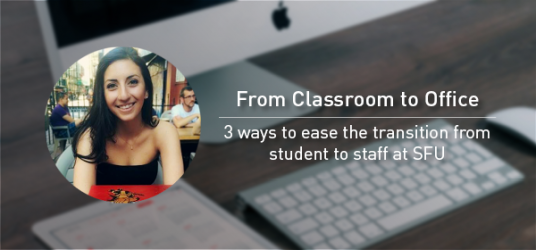
After months of perfecting your resume, cover letter, and interview skills, you’ve finally landed your dream Co-op job…and it just so happens to be right here at SFU. That should to be an easy transition, right? After all, you are a student here, having already mastered the often-tricky campus map and discovered all the good food spots, you feel confident that you’ll be right at home in your new position. While it’s true that you are familiar with the world of academia from a student’s perspective, you will soon uncover a whole new side to the university experience. Here are some tips to help successfully transition from university student to staff:
1. Put Your Observation Skills to Use
You’ve likely used your observational skills to aid you in your academic career thus far, and it will probably not surprise you that those skills can come in handy during your transition into a staff member as well. From dress code to work flow, every office will have its own unique way of doing things; some that you can pick up on as early as your first interview, while others may have to wait until you begin your position to learn. During your work term, be as observant as possible to both implicit cues and explicit rules about your workplace. If it hasn’t already been clarified by your supervisor or coworkers, ponder these questions:
-
How do people usually dress around the office? Are there certain meetings or days that people tend to dress up or down for?
-
What time do people typically break for lunch? Do they keep to themselves for their breaks, or hang out together in a common area?
-
What tone or language do my coworkers use when communicating at work via email, Instant Messenger, or meeting minutes?
These questions, along with others that you may think of, can help you gauge the University work environment, and help you find your unique place on the team.
2. Pick Your Coworkers’ Brains
As a new Co-op student, you will certainly have a lot of learning to do on the job, especially in your first few weeks. Once you have settled in, challenge yourself to further the knowledge that you are gaining from your assigned tasks by reaching out to your coworkers to supplement that information. Once you become familiar with a few colleagues, try engaging with and learning more about them, like their professional expertise, for example. Personally, I enjoy learning about the educational backgrounds or skillsets of my coworkers, as it is always fascinating for me to see the large range of talent that is contributed to a team.
3. Join in on Social Activities
Most undergraduates have some experience in extracurricular activities, like clubs or volunteering opportunities. Similarly, most offices have different social activities that serve a variety of interests around the office. This can range from the office’s Social Committee, the lunchtime running club, or even a group of board game aficionados (our office happens to have all three). Every office has its own unique set of social activities that you could partake in. Apart from it being a fun way to get to know your coworkers, it can also double as an opportunity to try something new, like event planning, getting in shape, or improving your strategy skills. If none of the current social activities going on at your office interest you, try starting your own! It’s a good way for the office to get to know their newest team member beyond a job description.
So, as you prepare to immerse yourself into this simultaneously familiar and unfamiliar work environment, remember to draw upon the skills and experience you’ve gained throughout your time as a student here to observe, engage with, and participate in the SFU community in a whole new way.














